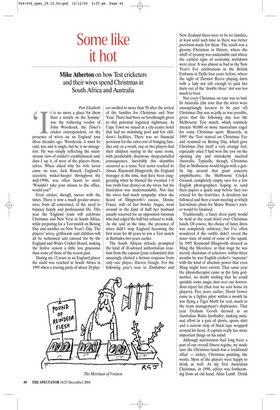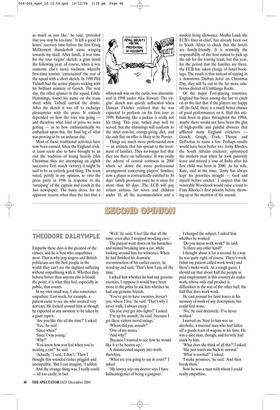Some like it hot
Mike Atherton on how Test cricketers and their wives spend Christmas in South Africa and Australia
Port Elizabeth
‘It is no more a place for them than a trench on the Somme’ was the withering verdict of John Woodcock, the Times’s cricket correspondent, on the presence of wives on an England tour three decades ago. Woodcock, it must be said, was and is single, but he is no misogynist. He was simply reflecting the mainstream view of cricket’s establishment and, dare I say it, of most of the players themselves. When asked why his wife never came on tour, Jack Russell, England’s eccentric wicket-keeper throughout the mid-1990s, was often heard to snarl, ‘Wouldn’t take your missus to the office, would you?’ Even cricket, though, moves with the times. There is now a much greater awareness, from all concerned, of the need to balance family and professional life. This year the England team will celebrate Christmas and New Year in South Africa, while preparing for a Test match on Boxing Day and another on New Year’s Day. The players’ wives, girlfriends and children will all be welcomed and catered for by the England and Wales Cricket Board, making the festive season a little less gruesome than some of those of the recent past.
During my 13 years as an England player the nadir was reached in South Africa in 1995 when a touring party of about 20 play ers swelled to more than 70 after the arrival of the families for Christmas and New Year. There had been no forethought given to this potential logistical nightmare. In Cape Town we stayed in a city-centre hotel that had no swimming pool and few children’s facilities. There was no financial provision for the extra cost of bringing families out; as a result, one or two players had their children staying in the same room, with predictably disastrous sleep-curtailed consequences. Inevitably this shambles occurred as a tense Test series reached its climax. Raymond Illingworth, the England manager at the time, may have been exaggerating when he blamed the eventual 1–0 loss (with four draws) on the wives, but his frustration was understandable. Not that the wives had much sympathy: when she heard of Illingworth’s excuse, Denise Fraser, wife of fast bowler Angus, went around in the kind of huff her husband usually reserved for an opposition batsman who had edged the ball but refused to walk. As she said at the time, the presence of wives didn’t stop England becoming the first team for 60 years to win a Test match in Barbados two years earlier.
The South African debacle prompted the kind of ill-advised authoritarian reaction from the captain (your columnist) that amazingly elicited a furious response from only one player, Darren Gough. For the following year’s tour to Zimbabwe and New Zealand there were to be no families, at least until such time as there was better provision made for them. The result was a gloomy Christmas in Harare, where the whiff of tyranny was undeniable and where the earliest signs of economic meltdown were clear. It was almost as bad as the New Year’s Eve celebrations in the British Embassy in Delhi four years before, where the sight of Dermot Reeve playing darts with a lady not tall enough to pick her darts out of the ‘double three’ slot was too much to bear.
Not every Christmas on tour was so bad. In Australia (the tour that the wives were unsurprisingly keenest to be part of) Christmas Day was as jolly as was possible, given that the following day was the Melbourne Test match, which routinely attracts 90,000 or more Australians eager for some Christmas sport. Bizarrely, in 1995 the Test started on Christmas Eve and resumed on Boxing Day, which gave Christmas Day itself a very strange feel, especially since I had won the toss on the opening day and mistakenly inserted Australia. Typically, though, Christmas Day in Melbourne would begin with a gentle lap around that giant concrete amphitheatre, the Melbourne Cricket Ground, completely empty save for a few English photographers hoping to send their papers a quick snap before they too retired for the festivities. A desultory net followed and then a team meeting at which last-minute plans for Shane Warne’s zooter would be finalised.
Traditionally, a fancy dress party would be held at the team hotel over Christmas lunch. Of course, the choice of fancy dress was completely arbitrary, but I’ve often wondered if the outfits didn’t reveal the inner state of mind of some of the squad. In 1995 Raymond Illingworth dressed as Ming the Merciless: at that stage he was merely chairman of selectors; within three months he was English cricket’s ‘supremo’ with the kind of absolute power that even Ming might have envied. That same year the physiotherapist came as the fairy godmother, no doubt wishing that he could sprinkle some magic dust over our horrendous injury list (that tour we sent home six players). Five years earlier, David Gower came as a fighter pilot: within a month he was flying a Tiger Moth for real, much to the team management’s displeasure. That year Graham Gooch dressed as an Australian Rules footballer, making minimal effort in a pair of shorts, sports shirt and a narrow strip of black tape wrapped around his head. A captain really has more important things on his mind.
Although nutritionists had long been a part of our overall fitness regime, we made sure the Christmas lunch was a traditional affair — turkey, Christmas pudding, the works. Most of the players were happy to drink as well. At my first Australian Christmas, in 1990, advice was forthcoming from an old hand, Allan Lamb. ‘Drink as much as you like,’ he said, ‘provided that you stop by tea-time.’ It left a good 18 hours’ recovery time before the first Craig McDermott thunderbolt came winging towards my skull. After lunch, it was time for the tour virgins’ sketch: a grim (until the following year, of course, when it was someone else’s turn) tradition whereby first-time tourists ‘entertained’ the rest of the squad with a short sketch. In 1990 Phil Tufnell had the senior players rocking with his brilliant mimicry of Gooch. The next day, the other spinner in the squad, Eddie Hemmings, found his name on the team sheet while Tufnell carried the drinks. After the sketch it was off to exchange pleasantries with the press. It entirely depended on how the tour was going and therefore what kind of press we were getting — as to how enthusiastically we embarked upon this, the final leg of what was proving to be an arduous day.
Most of those traditional activities have now been canned. Since the England cricket team seem also to have brought to an end the tradition of losing heavily (this Christmas they are attempting an eighth successive Test match victory), it might be said to be an entirely good thing. The team voted, pettily in my opinion, to veto the press party in 1996 in response to the ‘turniping’ of the captain and coach in the Sun newspaper. The fancy dress, for no apparent reason other than the fact that a whitewash was on the cards, was discontinued in 1998 under Alec Stewart. The virgins’ sketch was quietly suffocated when Duncan Fletcher realised that he was expected to perform on his first tour in 1999. Behaving like a jackass is really not his thing. This year, turkey may well be served, but the trimmings will conform to the strict non-fat, energy-giving diet, and the only fizz on offer is likely to be Perrier.
Things are much more professional now — an attitude that has spread to the treatment of families. They no longer feel that they are there on sufferance. It was really the advent of central contracts in 2000 which set down the more professional arrangement concerning players’ families; now a player is contractually entitled to 30 days’ family provision once he is away for more than 60 days. The ECB will pay return airfares for wives and children under 18, all the accommodation and a modest living allowance. Medha Laud, the ECB’s fixer-in-chief, has already been out to South Africa to check that the hotels are family-friendly. It is normally the responsibility of the host nation to pick up the tab for the touring team, but this year, for the period that the families are there, the ECB has taken charge of hotel bookings. The result is that instead of staying in a downtown Durban hotel on Christmas Day, they will be out in the far more salubrious district of Umhlanga Rocks.
Of the major Test-playing countries, England has been among the last to catch on to the fact that if the players are happy off the field, there is a much better chance of good performances on it. Had this attitude been in place throughout the 1990s, maybe there would not have been the glut of high-profile and painful divorces that afflicted many England cricketers Gooch, Gough, Cork, Thorpe and DeFreitas to name a few. Perhaps results would have been better too. Jonty Rhodes, the South African cricketer, epitomised the modern man when he took paternity leave and missed a tour of India after his first child was born in 2000. As his wife, Kate, said at the time, ‘Jonty has always kept his priorities straight — God and myself before cricket.’ I suspect that the venerable Woodcock would raise a toast to Frau Rhodes’s first priority before throwing up at the mention of the second.


















































































 Previous page
Previous page